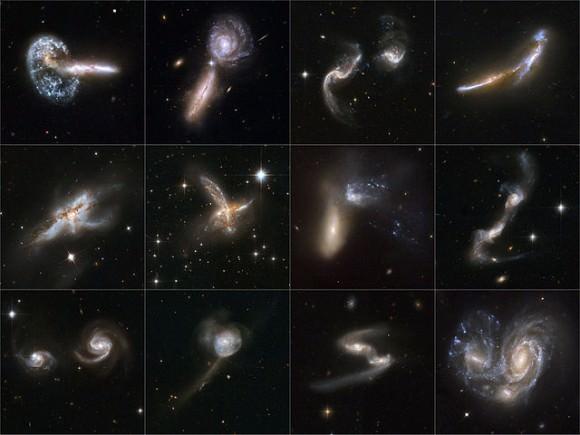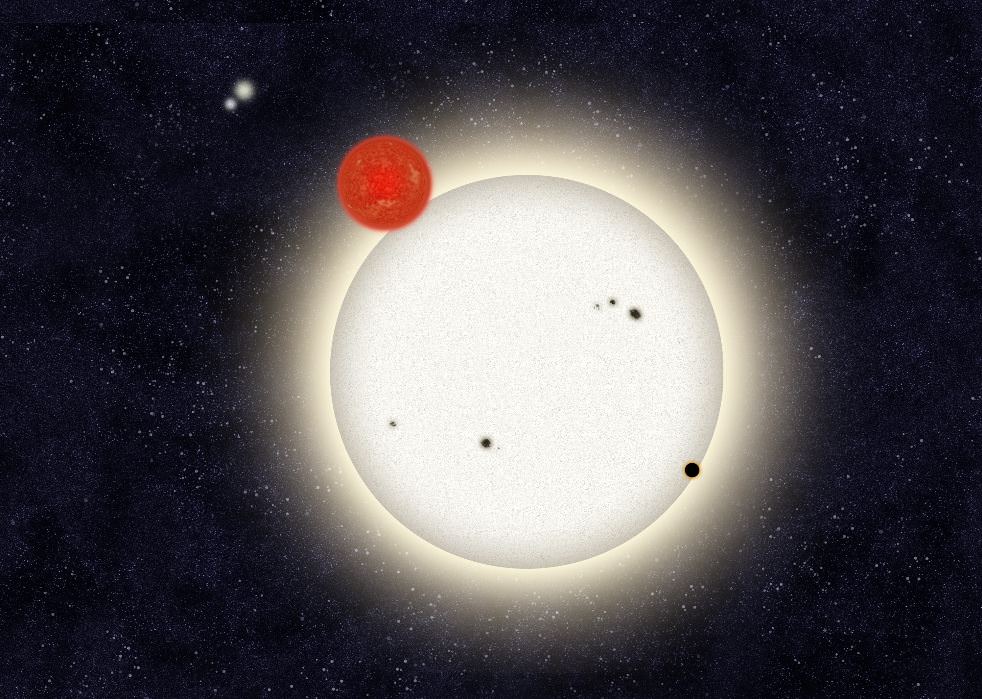Maybe it’s because Jurassic Park is in theaters again, but we at Universe Today sometimes worry about how one person can mess up an otherwise technologically amazing system. It took just one nefarious employee to shut down the dinosaur park’s security fences in the movie and cause havoc. How do we ensure science can fight against that, especially when everyday citizens are getting more and more involved in the scientific process?
But perhaps, after talking to Chris Lintott, that view is too suspicious. Lintott is in charge of a collaborative astronomy and science project called the Zooniverse that uses public contributions to fuel some of the science he performs. Basically, anyone with an Internet connection and a desire to contribute can hunt for planets or examine astronomical objects, among many other projects.
Lintott, an astrophysicist at the University of Oxford, says the science requires public contributions. Moreover, he hasn’t had a problem yet despite 800,000 individual contributors to the Zooniverse. He told Universe Today about how that’s possible in an e-mail interview.
1) Zooniverse has already produced tangible scientific results in space through collaborating with ordinary folks. Can you talk about some of the papers/findings that have been produced in your various projects?
There’s a long, long list. I’m particularly excited at the minute about our work on bulgeless galaxies; most spiral galaxies have a bulge full of old stars at their centre, but we’ve found plenty that don’t. That’s exciting because we think that means that they’re guaranteed not to have had a big merger in the last 10 billion years or so, and that means we can use them to figure out just what effect mergers have on galaxies. You’ll be hearing more about them in the next year or so as we have plenty of observing time lined up.
I’m also a big fan of Planet Hunters 1b, our first confirmed planet discovery – it’s a planet in a four-star system, and thus provides a nice challenge to our understanding of how planets form. We’ve found lots of planet candidates (systems where we’re more than 90% sure there’s a planet there) but it’s nice to get one confirmed and especially nice for it to be such an interesting world.

2) What benefits have you received from involving the public in space projects, in terms of results as well as raising awareness?
We couldn’t do our research any other way. Astronomers have got very good in the last few decades at collecting information about the universe, but we’re not always so good at learning how to use all of that information. The Zooniverse allows us to collaborate with hundreds of thousands of people so that we can scale our efforts to deal with that flood of data, and many of those volunteers go much further than just clicking on buttons we provide. So really our research is now driven in collaboration with thousands of people, spread all around the world – that’s an inspiring thought.
3) How many people do you manage in your space projects, approximately? How do you keep track of them all?
We have more than 800,000 registered volunteers – luckily, the computer keeps track of them (when they log in!).
4) How do you ensure their results meet the standards of scientific publication?
We carefully design projects so that we’re sure they will produce scientifically useful results before they’re launched; this usually means running a test with a small amount of data and comparing work done by volunteers with that of professionals. We usually find the volunteers are better than us! It helps that we have several people complete each task, so collectively we don’t make accidental mistakes.
5) How do you guard against somebody deliberately or accidentally altering the results?
The system insists that every classification is independent, and as we have several people look at each classification finding any deliberate attack would be easy – in any case, we’ve never seen any evidence of such a thing. Despite popular reports, most people are nice!


Elizabeth, your comment about a couple people “messing it up” for others is one I heard commonly at NASA. For example, from an award-winning college student who now has dozens of published papers: That nuclear power would work fine, if only contractors followed all the regulations, if there were no lazy employees, if there were no terrorists. But the point is — which she always seemed to miss — there is no such environment, and perforce, nuclear power might never be safe. Her years of schooling — partly underwritten by the nuclear industry — caused her to be incapable of believing the whole concept could be fatally flawed.
More recently, a relative who was extremely desperate for a job found a position in a nanotech company. He’s got an MBA. In all the years I’ve known him, I’ve never heard him raise any social concern. To him, an ideal job is being in a competition with another company that’s selling essentially the same product. Are there severe, potentially catastrophic problems with nanotech? I think so. He’s unlikely to think about them. Or to care.
Techies are fond of extolling all the great things their passions might do, while hugely ignoring the bad things.
It’s not about one person “messing it up”. It’s about the process of technological discovery ignoring inconvenient problems.
Someone with the 2 most common names John, Smith, is messing it up for E.H.
I had a female collegue once who walked around staring at the floor due to such behavior until he got fired. She ended up a smiling person.
Remind us again about deaths from nuclear power vs deaths from coal, etc. But yes, systems need to be robust enough to withstand humans being human. And folks need to do what the Foresight Institute is doing, attempting to think thru nano tech impacts before the technology arrives. As always we need to accept that however hard we necessarily strive, imperfection will be the end product, but better imperfection than avoidance, neglect or deliberate ignorance.
Hi Philip. The problem isn’t the short-range obvious one. It’s that we already have supposedly safe nuclear stores leaking. It’s that we have a maniac in North Korea, threatening millions, and by extension the world. Yes, 1,000s of coal miner’s lives have been saved. But also yes, 5,000,000 innocents could die tomorrow because a kid in North Korea gets pissed off. It’s not even a close trade.
But those aren’t the only problems. The one that really scares me is two nuclear powered subs colliding at speed. Submarines do hit things by accident fairly regularly, you know. It was just a couple years ago the captain of a UK nuclear sub grounded it … on a sandbar near his own port!
Sandbars are dynamic structures so the charted depths are not always correct. This was the reason for the UK submarine hitting the sandbar. They can’t use active sonar to find them as that would result in them being tracked by ‘enemy’ hydrophones.
HEAR HEAR! I agree. Something like, out of sight, out of mind thing. It can & does bring devastating consequences. A snow ball effect. Passing the buck & laziness are factors we cannot tolerate. For many years I have been in R&D-QC(research/development-quality control). It works.There is/are always those cracks we seem to fall through. ..take care.
This kind of problem has plagued humanity from the beginning of civilization and continues to do so. The mere invention of fire led to both intentional and unintentional mass vegetation burns that impacted measurably impacted the global climate.
http://world.edu/the-discovery-of-fire-initial-steps-toward-anthropogenic-climate-change/
Even in medicine where unintended consequences are intentionally screened for, numerous medicines are withdrawn due to hazardous side effects, sometimes long after they hit the market.
http://en.wikipedia.org/wiki/List_of_withdrawn_drugs
The least that should be done is an analysis of potential hazards of new products and industrial by-products. This should be followed by testing of the actual products in a realistic home environment. Finally follow-up studies should be done to look for unexpected hazards in the environments affected. This of course would require pre-screening to establish a baseline.
The sad part is that this is rarely, if ever done. If this kind of screening were required to be built in to the production process costs, then we would likely already know what is causing things like the increasing cases of autism in industrialized nations.
The counter-argument I hear is all about cost to the manufacturers. My counter-argument then is what about the cost of all the preventable damage done? Guess which of those costs is greater? It is always in the best interests of manufacturers and industry to see no, hear no, and speak no evil about unuintended hazards of their products and production process. Therefore the government needs to take the lead in managing these costs since they ultimately foot the bill for most of the damage that is done to the citizens and the environment. Such an initiative for the government and society would most certainly be cost-effective. But alas forward-thinking is outside the box and seems to be beyond the capability of most legislators. The fact that they rely on maufacturers for the bulk of their campaign funds does not help matters.
Yep, GregtheThird, it’s always been a problem for humanity. I don’t think there’s any miracle solution, either. A friend was telling me what a “wonder vegetable” broccoli is. That it has 4,000 some compounds. My thought was … they can’t all possibly be good for us!
We see what happens with new medicines that have substantial testing. They are years delayed to market, and the price is hugely increased. Some people agree to take them anyway, as a test group, but that only works for people and symptoms that are really severe.
I think the answer to all this will be hugely unacceptable to almost everyone. And yet, I guess it will be forced on us, nonetheless. And that is simply to stop development of all new chemicals and drugs. At least for now. In 50 years, when it’s obvious to society at large that things are “under control”, maybe it would be time to reassess, on a limited basis.